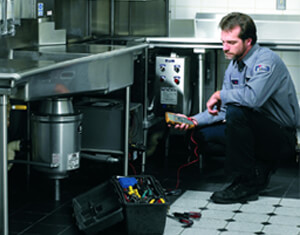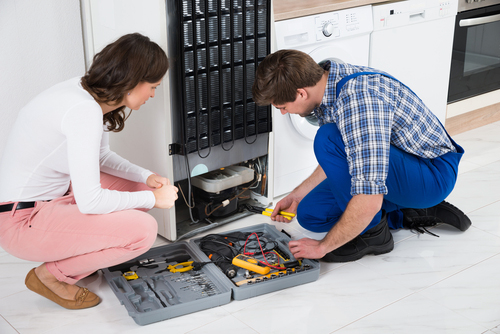Important Tips for Effective Ref Repair Service to Expand Appliance Life Expectancy
When it comes to your refrigerator, appropriate repair work and upkeep are vital for durability. Comprehending common issues and recognizing when to act can make all the difference.
Understanding Typical Refrigerator Troubles
Fridges are crucial in keeping your food fresh, but they can come across a variety of usual troubles that interrupt their efficiency. One constant problem is insufficient air conditioning. If you discover food ruining quicker than typical, check the thermostat setups or take into consideration if the door seals are damaged. Another typical trouble is excessive sound, which can show a malfunctioning compressor or a failing follower. You might additionally experience water merging inside or underneath the fridge; this usually arises from a clogged up defrost drainpipe or a damaged water line. In addition, if your refrigerator's light isn't functioning, it can be a simple light bulb problem or a trouble with the door button. Ultimately, ice buildup in the fridge freezer can hinder air flow and cooling down efficiency. Recognizing these concerns early can conserve you time and cash in repair work, guaranteeing your refrigerator runs smoothly and effectively.
Regular Maintenance Practices
To maintain your devices running efficiently, you need to remain on top of normal maintenance practices. Tidy the condenser coils, check the door seals, and keep an eye on the temperature level settings to guarantee peak performance. These basic jobs can save you money and time on repair work down the line.
Tidy Condenser Coils Frequently
Cleansing your condenser coils regularly can significantly improve your appliance's efficiency. Dust and dirt build up on these coils over time, creating your appliance to function more challenging and take in more power. To maintain them clean, unplug your device and very carefully eliminate any safety covers.
Examine Door Seals
Three simple actions can help you guarantee your appliance's door seals are in good condition. Second, clean the seals using warm, soapy water to get rid of any type of debris or grime. By following these steps, you'll maintain your appliance's performance and long life, conserving you money on energy costs and repairs in the lengthy run.
Monitor Temperature Level Setups
Routinely monitoring your device's temperature level setups is essential for finest efficiency and efficiency. Whether you're dealing with a refrigerator, freezer, or stove, keeping an eye on these setups can protect against numerous issues. For fridges, go for temperatures in between 35 ° F and 38 ° F; for freezers, linger 0 ° F. If the temperatures are expensive or reduced, your home appliance might function harder, squandering power and shortening its lifespan. Utilize a thermometer to examine these settings on a regular basis, particularly after significant modifications, like moving your device or changing the thermostat. If you discover variations, change the setups as necessary and seek advice from the user guidebook for support. By staying positive concerning temperature surveillance, you'll guarantee your devices run smoothly and last much longer.
Troubleshooting Air Conditioning Issues
When your refrigerator isn't cooling down effectively, it can cause ruined food and wasted cash, so addressing the issue quickly is critical. Beginning by examining the temperature settings to confirm they're at the suggested levels, normally around 37 ° F for the refrigerator and 0 ° F for the fridge freezer. If the settings are right, evaluate the door seals for any kind of voids or damages; a faulty seal can allow warm air to enter.
Inspect the condenser coils, typically located at the back or bottom of the unit. Tidy them with a vacuum cleaner or brush to enhance performance. If troubles persist, it might be time to call a specialist.
Fixing Water Leak and Ice Accumulation
If you're dealing with water leakage or ice accumulation in your device, it's important to recognize the source of the trouble. By identifying where the water is coming from, you can prevent further concerns and avoid expensive repair work. Allow's explore some reliable strategies to deal with these usual issues.
Determine Leakage Sources
How can you properly identify the sources of water leak and ice build-up in your devices? Beginning by evaluating the seals and gaskets on your refrigerator and fridge freezer doors. A used or damaged seal can permit warm air to go into, causing condensation and ice. Next, examine the drain frying pan and drainage system for blockages or clogs; a backed-up drain can cause water merging. Search for any kind of loose links in the supply of water line, which can develop leaks. Check out the defrost drain for ice accumulation, which can disrupt appropriate drain. By methodically examining these areas, you'll identify the source of the problem, allowing you to take the needed actions to repair it and extend your appliance's life-span.
Prevent Ice Formation
To stop ice formation in your appliances, start by confirming the temperature settings are ideal. If your refrigerator or fridge freezer is also cool, it can cause extreme ice build-up. Check the door seals regularly; harmed seals can allow cozy air in, triggering weblink condensation and ice formation.
Keep the device well-ventilated and stay clear of congestion, as this can block air flow - GE appliance repair Oro Valley Dependable Refrigeration & Appliance Repair Service. Routinely thaw your fridge freezer if it doesn't have an automated defrost feature.
If you see water leak, determine and fix any kind of blocked drainage openings, as they can add to ice accumulation. Tidy the coils and verify they're operating properly to preserve peak performance. Taking these steps will help prolong your home appliance's life-span and effectiveness.
Addressing Noisy Fridge Sounds
While it may appear startling, a noisy refrigerator commonly signifies minor issues rather than major breakdowns. Usual culprits include the compressor, fans, and water lines.
Next, inspect for loosened things inside. Sometimes, containers or racks can rattle, creating unwanted noise. Tighten or reorganize them to remove the audios.
If you notice a clicking noise, it could be the defrost timer. This is normally safe but could indicate it needs examination.
Ultimately, verify your refrigerator is degree. An unbalanced home appliance can produce resonances and sound. Make use of a level to check, and readjust the feet if required. Dealing with these concerns immediately can assist maintain your refrigerator's efficiency and prolong its lifespan.
When to Change Components vs. Full Replacement

Think about the expense of repairs versus the home appliance's value. Additionally, if you discover recurring problems that maintain reoccuring, it's an indication that your home appliance has gotten to the end of its life.
Understanding When to Call a Specialist
Just how can you inform when it's time to call in a specialist for device repair service? If your device quits working completely or regularly journeys circuit breakers, it's another red flag.
You ought to additionally consider your very own convenience level with fixings. If you're unclear concerning detecting the trouble or lack the right tools, it's finest to connect for assistance. Keep in mind, trying difficult repairs can result in more damage and even safety hazards.

Often Asked Concerns
Just how Often Should I Tidy the Refrigerator Coils?
You ought to clean your refrigerator coils every six months. This aids preserve efficiency and protects against overheating. If you see excessive dirt or family pet hair, tidy them more regularly to guarantee your refrigerator runs smoothly.

Can I Use Vinegar for Cleaning My Fridge?
Yes, you can utilize vinegar to cleanse your refrigerator! It's an outstanding all-natural cleanser that gets rid of odors and stains. Dependable Refrigeration & Appliance Repair Service LG Appliance Repair. Simply mix it with water, apply it to surfaces, and wipe down for a fresh, clean fridge
What Temperature Should My Refrigerator Be Ready To?
You need to set your refrigerator to 37 ° F(3 ° C) for ideal food preservation. This temperature keeps your food fresh while stopping spoilage, guaranteeing your groceries last longer and minimizing waste. It's a simple adjustment you can make!
Does a Refrigerator Required to Be Leveled?
Yes, your fridge needs to be leveled. If it's unequal, it can affect cooling down performance and trigger excess sound. Inspect the leveling legs and readjust them to ensure proper equilibrium for ideal performance.
Just How Can I Minimize Fridge Energy Usage?
To minimize your refrigerator's energy intake, keep it clean and well-ventilated, check door seals for leakages, set the temperature in between 35-38 ° F, and stay clear of overwhelming it. These steps can considerably lower your energy expenses.
Comments on “7 Benefits of Choosing Washing Machine Repair Dependable Refrigeration & Appliance Repair Service Over Buying New”